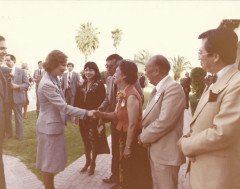Lifestyle Spotlight
Former First Lady Rosalynn Carter Passes Away at Age 96
Stanford’s New Allergy Clinic Treating Seasonal Sufferers, Complex Cases
The nice weather that makes Northern California so attractive creates ideal conditions for allergies, according to Kari Nadeau, MD, PhD of Stanford Medical Center's Division of Allergy, Immunology and Asthma.
PALO ALTO, Calif.--(BUSINESS WIRE)--The wonderful weather that makes Northern California so attractive also creates ideal conditions for allergies, according to Kari Nadeau, MD, PhD of Stanford Medical Center's Division of Allergy, Immunology and Asthma.
"Almost one out of every 11 people on the Peninsula has some form of allergy," said Nadeau, who is on the staff of Stanfords new Allergy Clinic. Nadeau says the Bay Area has many pollens, dust and molds that stimulate a lot of common allergies and theres no winter cold season to provide respite from pollen.
Although common, allergies of the eye (allergic conjunctivitis), nose (allergic rhinitis) and lung (allergic asthma) can escalate into serious complications, according to Nadeau. Sinusitis as well as other infections that can spread to other parts of the body, including the brain and lungs; hearing loss and a variety of breathing complications such as sleep apnea and asthma may occur. Allergies also are a contributing factor to many chronic sinus infections.
Over-the-counter medications control symptoms for 10 to 20 percent of allergy sufferers. Prescription medications and nasal sprays help another 30 to 40 percent. But about half of all allergy sufferers fail to find relief with these methods, whose primary aim is to control the allergy symptoms rather than treat the allergy.
"These medicines are 'band aids'," Nadeau said. "It's better to know what you are allergic to and to try to prevent allergies by decreasing exposure. Other therapies, like allergy immunotherapy, can decrease a person's allergies to the allergens they had allergies to.
A part of Stanford's Ear, Nose and Throat (ENT) Sinus Center, led by Dr. Peter Hwang, the Allergy Clinic includes allergists and ENT specialists in one location, as well as a broad array of diagnostic tools and treatments. The clinic treats both adults and children and also participates in trials of potential new treatments. The clinic is currently involved in a clinical trial of medications administered under the tongue that may be as effective as the shots now used to help patients develop tolerance for allergens. Symptom-relief treatments range from antibiotics to control infection, to surgical procedures, to better methods to treat allergies.
For more information about the Allergy Clinic or to make an appointment, please call 650-723-5281.
Website: http://www.stanfordhospital.com


